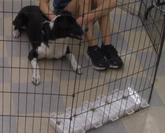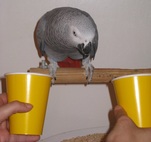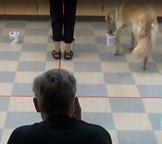Projects
My research involves collaborations with colleagues at a variety of universities as well as University of Puget Sound undergraduates. Below is an interactive list of some past and current research projects. Please visit my lab's website for more additional projects.
Canine Social Behavior
2021-Current
Data from two recent social cognition studies are being analyzed. The first measured dogs' willingness to accept a smaller quantity of food (1 vs. 3) when a human stranger showed interest in it. The second assesses the influence of oxytocin on dogs' ability to solve a treat puzzle that has been demonstrated by a human stranger. Stay tuned for the results of both!
Data from two recent social cognition studies are being analyzed. The first measured dogs' willingness to accept a smaller quantity of food (1 vs. 3) when a human stranger showed interest in it. The second assesses the influence of oxytocin on dogs' ability to solve a treat puzzle that has been demonstrated by a human stranger. Stay tuned for the results of both!
Raptor String-Pulling Behavior
2010-2012; 2022-2023
This is an extension of our 2013 case study on the Harris' hawk. In that study, we found evidence of the same step-pull-step behavior reported in parrot and corvid string-pull work, and our hawk solved the task within 7 minutes upon first viewing the apparatus! These results are published in Ibis and can be read here. Below are some interesting apparatus-directed behaviors by our subjects in the 2022 extension project which is in press with the International Journal of Comparative Psychology.
This is an extension of our 2013 case study on the Harris' hawk. In that study, we found evidence of the same step-pull-step behavior reported in parrot and corvid string-pull work, and our hawk solved the task within 7 minutes upon first viewing the apparatus! These results are published in Ibis and can be read here. Below are some interesting apparatus-directed behaviors by our subjects in the 2022 extension project which is in press with the International Journal of Comparative Psychology.
Social Referencing
2011-2021
The purpose of the series of investigations is to determine whether or not intonation provides information during an ambiguous forced-choice task. These projects were first piloted with parrots, and now are being replicated and extended with dogs.
The purpose of the series of investigations is to determine whether or not intonation provides information during an ambiguous forced-choice task. These projects were first piloted with parrots, and now are being replicated and extended with dogs.
Strategic Use of Speech by a Nonhuman Speaker
2010-2013
There were four studies comprising my dissertation. All of them involved the use of transcription-based linguistic analysis of conversations between one African Grey, Cosmo, and her owner. I investigated four functional features of language: turn-taking and dialogue, volume modulation, manipulation, and response to refusal. Click the play button on the left to listen to a great example of Cosmo's requesting behavior and response to refusal to "go up" (i.e., to be let out of her enclosure).
There were four studies comprising my dissertation. All of them involved the use of transcription-based linguistic analysis of conversations between one African Grey, Cosmo, and her owner. I investigated four functional features of language: turn-taking and dialogue, volume modulation, manipulation, and response to refusal. Click the play button on the left to listen to a great example of Cosmo's requesting behavior and response to refusal to "go up" (i.e., to be let out of her enclosure).
The S.U.R.E. Workbook
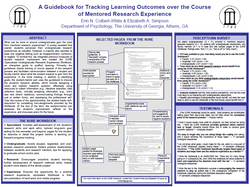
2010-2016
In collaboration with NIH postdoc Dr. Elizabeth Simpson, the purpose of the S.U.R.E. (Specialized Undergraduate Research Experience) Workbook is to tailor a research experience to the needs and goals of an undergraduate research assistant and his or her faculty mentor. The Workbook is freely available via email, and is currently being updated in preparation for publication. Click the photo to the left to view our poster from the 2010 Best Practices in Teaching conference in Atlanta, GA.
In collaboration with NIH postdoc Dr. Elizabeth Simpson, the purpose of the S.U.R.E. (Specialized Undergraduate Research Experience) Workbook is to tailor a research experience to the needs and goals of an undergraduate research assistant and his or her faculty mentor. The Workbook is freely available via email, and is currently being updated in preparation for publication. Click the photo to the left to view our poster from the 2010 Best Practices in Teaching conference in Atlanta, GA.
Social Context Influences Parrot Vocalizations
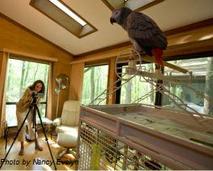
Videotaping Cosmo, the African Grey
2007-2009
My master's thesis investigated how varying a companion African Grey parrot's social context influenced her vocalization output. I recorded and transcribed the vocalizations of one female parrot and compared her rate of vocalizing, vocabulary, and thematic content while she was in the room with her owner, in separate rooms out of visual contact from her owner, alone in the house, and while being ignored by her caregiver who was talking to me. The results were published in the Journal of Comparative Psychology and can be read here.
My master's thesis investigated how varying a companion African Grey parrot's social context influenced her vocalization output. I recorded and transcribed the vocalizations of one female parrot and compared her rate of vocalizing, vocabulary, and thematic content while she was in the room with her owner, in separate rooms out of visual contact from her owner, alone in the house, and while being ignored by her caregiver who was talking to me. The results were published in the Journal of Comparative Psychology and can be read here.
Quantity Discrimination by Capuchin Monkeys
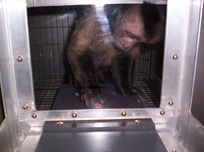
Leo positioning a token into the tray
2007-2009
For my first-year graduate project at the University of Georgia, I assessed capuchin monkeys' ability to sum quantities in two conditions. The first condition was color-coded tokens (e.g., red = 1 peanut) and the second was clear containers where peanuts were visible. Monkeys were shown pairs of different combinations of tokens or clear containers and allowed to choose one set.
For my first-year graduate project at the University of Georgia, I assessed capuchin monkeys' ability to sum quantities in two conditions. The first condition was color-coded tokens (e.g., red = 1 peanut) and the second was clear containers where peanuts were visible. Monkeys were shown pairs of different combinations of tokens or clear containers and allowed to choose one set.

